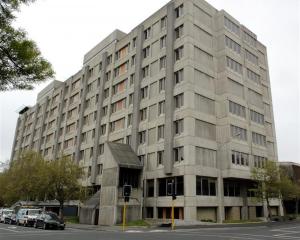
Bus services have been overhauled in the past two years, both in Dunedin and Queenstown.
In August the council said patronage in the Dunedin network had grown by 8% since last year and in Queenstown there had been a 64% increase.
Incumbent councillor and candidate Michael Deaker said the last three to four years had been a ''success story''. The council introduced more direct routes and centralised its Dunedin system around its Great King St bus hub.
''Five or six years ago we were stuck on 1.5 million passengers per year. Now we're 2.5 million per year. You can't argue with that; that's all heading in the right direction.''
It now needed to consult on what it needed to do better.
It was ''inexcusable'' bus drivers were not paid a living wage, he said.
There were also tweaks needed, such as increased services for the northern route to Palmerston, which did not run at weekends.
The council needed to seriously consider replacing its ''fleet of diesel dinosaurs'' with electric vehicles.
In terms of Queenstown it was a great success, but there was still work to do.
''The problem is congestion, buses can't get through the Frankton highway any faster than you or I.''
Councillor and candidate Bryan Scott pointed to buses now being accessible for people with disabilities as a success.
''Fundamentally, I believe we have had some success in Dunedin and Queenstown in getting the foundations of a good bus system.''
He would also like to see electric buses.
In Queenstown there were significant patronage increases, but they needed to be ''future proofed''.
The council must look for bold solutions such as investigating light rail, he said.
Candidate and current Dunedin city councillor Kate Wilson said there was some ''real opportunity'' for buses in Otago.
''As far as Dunedin goes, I think the changes to come to date were absolutely necessary, but it took far too long and it's only part of the journey.''
The council must be ''much more reactive to demands of people'', she said.
''The regional council needs to be trialling more systems. I love what Auckland is doing with free buses in the weekends. I think there is a whole lot of opportunity.''
The council also needed to investigate regional bus travel, she said.
''People find it very hard to connect regionally.''
Drivers should also be paid ''at least'' the living wage.
The council received criticism for its resistance to the pleas of Dunedin residents who wanted route and timetable tweaks to make it easier for children on the Otago Peninsula to get to school.
Staff did not favour the idea, but councillors were eventually convinced and it changed at the beginning of this year.
Tahuna School principal Tony Hunter, who is standing for council this year, said the situation left him ''very disappointed with the process''.
''It was a very common-sense decision to be made. Eventually the ORC agreed with us and put something in, but it took over a year.''
The bus was now full every day, he said.
''It was also not a good consultation process for the hub and the service around that.''
If he was elected he would push for more engagement, he said.
''That's what everyone wants. They want to be heard.''
Queenstown-Lakes District councillor and regional council candidate Alexa Forbes said changes to the Queenstown service were ''really good as a start''.
The regional council was slow in introducing the next stages, she said.
''The service we've got is not much better from the day it opened.''
It needed to assess the quality of the buses in regards to their carbon footprint.
It also must expand its gaze to transport from Wanaka, Cromwell and Alexandra.
''I think that conversation needs to happen now.''
Councillor and candidate Gretchen Robertson said the council made some ''very conscious decisions to improve public transport'' in the past decade.
Figures were ''outstanding'' and surveys showed high satisfaction.
Its transport plan would soon be up for review which would be a chance to consider how it could build on its success.
''We need to plan for the future not the past. An obvious issue is Queenstown's needs. A huge piece of the congestion puzzle is shifting the way people commute.
Water taxis, light rail, active transport, and other modes were being considering ''actively''.
''The way people move around Central Otago and Queenstown Lakes Districts needs to be part of the upcoming regional public transport review.''
Comments
Half of my ORC rates goes to Dunedin's buses- that is a success?- give me a break. It will be a success once my ORC rates have a ZERO beside the bus contribution line. We can only wish success..but the technocrats have other ideas of success- more buses/drivers/people....with an average of 2-3 full fare paying per trip- what a success...A black hole for decades. For all you greenies that want to support our near empty bus system- how about you get out of your cars, better still sell your cars and lead by example. Thought not..











